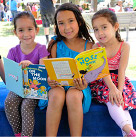Language is fundamental to our ability as humans to communicate with one another. Whether the message is informative, supportive or disciplinary, learning to speak and process the spoken word is an essential skill for children to develop.
What is Language Development in Early Childhood?
The most critical stages of language development take place in the first three years of life, when the brain is developing and maturing. Language learning actually begins prenatally, according to a University of Washington study, when an unborn child hears the sounds and rhythms of language in the womb. During this period of time, the young brain is quick to absorb language, so it’s important to create a rich learning environment. Language development involves multiple domains of learning, such as cognitive, social-emotional, physical, and sensory. Children who are not exposed to language during this critical time may struggle to learn it later.
Why is Language Development Important in Early Childhood?
There are many benefits of language development for children’s overall growth and well-being. First and foremost, it is a critical window of opportunity for optimal learning outcomes and brain plasticity. Language learning can positively impact other areas of education, such as:
- Cognitive skills (e.g., memory, reasoning, problem-solving)
- Social-emotional skills (e.g., self-regulation, empathy, relationship-building)
- Academic achievement (e.g., math, science)
- Literacy skills (e.g., reading comprehension, writing expression).
Language and literacy development go hand in hand. While language allows people to express their ideas in a meaningful way such as verbally, written, by signing, or making other gestures, such as eye blinking or mouth movements, literacy is a skill the child will use to read and write. A strong foundation in spoken language will help the growing child better acquire the written form.

Children who are dual language learners (DLLs) need intentional support to develop their home language as well as acquire English, according to Head Start. One of the first challenges faced by infants during language acquisition is identifying word boundaries in continuous speech, according to a study published in Psychological Science.
Visit our Ages and Stages blog to learn more about when to expect a child to begin speaking.
Stages of Language Development in Early Childhood
There are seven distinct stages of language development. Given that each child develops at their own unique pace, the child’s age may not align exactly with the stages outlined below. It’s important to speak with your child’s pediatrician about concerns you may have regarding developmental delays.
The prelinguistic stage occurs between 0 and 12 months. In this very first stage of language development, infants make random sounds and babble – this is a sign they are learning to communicate. This stage usually starts with cooing and other similar sounds, which leads to babbling and use of vowels and consonants.
The holophrastic stage is between 12 to 18 months and it’s known as the single word phase of learning, where a child will use a single word to mean many different things. They just haven’t yet learned how to use other words to represent those thoughts.
Between 18 to 24 months, a child enters the two-word stage. They may begin using two-word combinations to form a simple phrase. While these phrases will not be sophisticated words or sentences, you will likely begin to understand what they’re trying to convey.
The telegraphic stage between 24 to 30 months is when a child tries to communicate in short, bite-sized sentences. It may sound like a telegraph, as the name implies. These sentences will likely be missing verbs, articles, or prepositions that are needed to form more sophisticated thoughts. But this is a major step forward in language learning.
The early multi-word stage typically occurs after 30 months of age. It involves a broader vocabulary and may include plurals and verbs, though it will still be shorter in composition.
The later multi-word stage is a bit more developed and includes fuller, more complex sentences. A child may begin practicing these sentences around the age of 3 or 4.
The mature stage, when a child is 5 or older, might include more developed sentences that are spoken with increased confidence. Children at this age may exhibit a richer vocabulary and speak in greater detail.
CCRC is a partner within Help Me Grow LA, which directly connects families with resources to address any developmental delays.
Here are some activities for language development in early childhood:
- Storytelling – read your child a book
- Nursery rhymes – rhyme patterns help children identify patters in words
- Letter blocks – children begin to understand the shapes of letters
- Singing – this is a good way to help children have fun, while developing sentence structures that are memorable
- Talk to your child often
- Playing word-based games
- Encouraging social interactions with peers
- Encourage your child to express their thoughts and feelings through words, gestures, signs, or drawings.
- Acknowledging a baby’s initial sounds and gestures.
- Echoing and expanding upon the child’s vocalizations.
CCRC also offers many different events geared toward language development, such as story time and language workshops. Visit our event calendar for free events. Our child development experts created Milestones and More Play Kits to help families engage their children in learning at home.
What Are Some Signs of a Language Delay?
Language delays are not unusual but parents should always contact their pediatrician with any concerns of delays. All children develop in their own unique way, so not all milestones will be exact. But children may be experiencing development delays if:
- Not babbling by 12 months
- Not saying single words by 16 months
- Not saying two-word phrases by 24 months
- Having difficulty following simple directions or answering questions
- Having limited vocabulary or grammar
- Having trouble expressing needs or wants
- Having difficulty interacting with peers or adults
What Should I Do if I’m Concerned About My Child’s Language Development?
Parents and caregivers who have concerns about their child’s language development should consult their pediatrician. Visit our Families tab on the CCRC website to access additional resources.
Conclusion
Language development is key to a child’s ability to communicate and, later, read. Supporting that early learning through activities and engagement is essential and there are a number of different ways to introduce verbal and written communication into their play. All children develop at their own pace and in a unique way, so not all milestones will be met at the same time. But any parent or caregiver with concerns about their child’s language development should consult their doctor. Our Developmental Care Coordination program may also be a good resource for your family.
We know that you are the best source of information about your child and this program is a great way to help your child thrive. Contact us today.
1-866-67-4KIDS Ext. 9219 or email [email protected]



